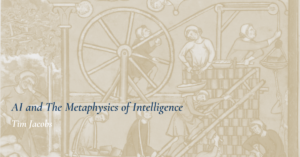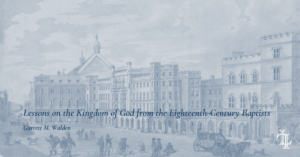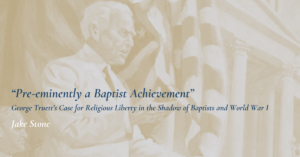Regular followers of the London Lyceum love reading. And for good reason! But oftentimes even those with seminary educations wonder where to start and where to go next when it comes to analytic, Baptist, or confessional theology. So, I’ve worked to create a list of recommended resources that can serve as a gateway to further reading for those not well acquainted with the literature below. I’ve included a few sentences with each resource to help guide you as well. But creating such a list for fields as diverse as these is no easy task. All three fields have numerous works, so I’m bound to leave out important and relevant ones. But the good news is that you can check out several of our more specific recommended resource lists on our site to possibly fill that gap. We have experts in their fields who recommend several “must-read” books as often as we can since we love reading. For example, Matthew Bingham has offered ten books for Early Modern English Baptists, Fellipe do Vale has offered six books on gender and theology, James Arcadi has offered six books for the Eucharist, J.T. Turner has offered ten books for anthropology, and Taylor Cyr has offered five books for free will.
As a note, I typically recommend books for various reasons and it doesnt always include my agreement with them. The four most common reasons are (1) because of the solid doctrinal content, (2) because of the ability to challenge and stretch one’s thinking, (3) because it provides a fair and clear presentation of the material, (4) and because it’s a required text in the field. So, I often recommend books I disagree with.
Now, while I’m more of an academic, I have deep pastoral roots. My father is a pastor. My grandfather was a pastor. My life has been centered around the life of the local church. So, while I do recommend several more serious reads that will take work for those not familiar with the material, I firmly believe serious intellectual stimulation is both beneficial and necessary for pastors.
Analytic Theology
Analytic theology is a diverse and growing field that typically utilizes the resources of analytic philosophy. In what follows I’ve mainly provided resources for analytic theology. And a lot of these resources are related to the doctrine of God because that’s what I like to study the most. There are a ton of resources in every doctrinal locus in analytic theology, I just don’t have the space to list them all. And as I noted, you can check out some of our other lists on the website to get a taste for some of these. Now, if you are interested in analytic philosophy, that is a different list altogether. If there is enough interest in such a list, I might attempt to draft one up!
An Invitation to Analytic Christian Theology by Thomas H. McCall (IVP Academic, 2015)
I’m asked all the time, “what is analytic theology?” And every time I send them to McCall’s book. It’s clear, it’s short, it’s readable, and it’s cheap. If you want to understand analytic theology, I can’t think of a better place to start. So, stop waiting around. Go ahead and buy it.
The Nature and Promise of Analytic Theology, James Arcadi, Jordan Wessling, Oliver Crisp (Brill, 2019)
I love this book for several reasons. First, I think it does a terrific job of explaining what analytic theology is and defending it from several spurious objections. Second, I am indebted to it for its idea of an “intellectual culture.” But the greatest value of this book if you want to learn more about analytic theology in general is probably the bibliography at the end. If you want more analytic theology resources and don’t know where to turn, grab this from your library and find the doctrinal locus most interesting to you.
Faith and Rationality: Reason and Belief in God, Edited by Alvin Plantinga and Nicholas Wolterstorff (University of Notre Dame, 1984)
I list this book partly because it’s good and partly because it’s the first sort of theological-philosophical book I ever read so it has a special place in my heart. It is full of thought-provoking essays. I didn’t understand 75% of it the first time I read it, but it’s worth it. I would start here before tackling Plantinga’s Warrant trilogy.
Eternal God, Paul Helm (OUP, 2011)
Helm is just great. I view him as a model of rigorous analytic theology from a Reformed perspective. And this is classic Helm. But if you buy this, please know the second edition is the one you want since it adds several chapters. If you buy a cheap used copy it’s probably the first edition.
The Untamed God: A Philosophical Exploration of Divine Perfection, Simplicity, and Immutability, Jay Wesley Richards (IVP Academic, 2003)
I think Richards makes several crucial mistakes in this work, but I think he does a terrific job of explaining the issues and explaining the various views available. For those interested in the doctrine of God debates, I think you need to read Richards.
God without Parts, James Dolezal (Pickwick, 2011)
In a similar way to Richards, I think Dolezal makes some mistakes in his argumentation for divine simplicity in this book, but I can’t think of a better explanation of the classical Thomistic doctrine of divine simplicity. Dolezal is clear and a faithful expositor. When it comes to strong Thomistic doctrines of divine simplicity, I recommend Dolezal before Duby every day of the week.
The Logic of God Incarnate, Tom Morris (Wipf and Stock, 2001)
Tom Morris is hard to beat for several reasons. First, he is eminently readable. Second, he is one of the pioneers of what later became known as analytic theology. If you want to read from one of the forebearers, you need to read Morris. And his Logic of God Incarnate is an absolute classic. If you want to think about Christology, you need to read Morris.
Does God Have a Nature? Alvin Plantinga (Marquette University, 1980)
Plantinga’s essay has been critiqued and ultimately shown to have serious flaws. However, it is a necessary read for those interested in the doctrine of God. He shaped the contemporary debate in many ways. Plus, Plantinga is an incredible thinker. Even when he is wrong, you learn how to think well. And he is an amazing human. How can you not like the guy? I am still laughing about his A/C unit explanation.
Divinity and Humanity, Oliver Crisp (Cambridge University, 2007)
Whatever Oliver Crisp writes is worth reading. He is clear, cogent, persuasive, fun, historically rooted, and every other good virtue you can think of. Whether you agree with Crisp or not, you’ll find yourself learning. Divinity and Humanity is the first book from Crisp I read and if you want to think well about Christology you need to own it and read it.
The Coherence of Theism, Richard Swinburne (OUP, 2016)
Swinburne is another thinker that will cause you to learn whether you agree with him or not. His insights are penetrating and his argumentation is relentless. I think Swinburne is wrong on a lot of important matters but I always learn from him and have the highest respect for him. His Coherence of Theism is required reading for those interested in the doctrine of God.
Persons: Human and Divine, Edited by Dean Zimmerman and Peter Van Inwagen (OUP, 2007)
This collected set of essays is fantastic. It’s somewhat dated now, but many of the essays remain worth their weight in gold. I’ve returned to several of them over a dozen times.
The Routledge Companion to Metaphysics, Edited by Robin Le Poidenvin, et. al. (Routledge, 2011)
I’m asked quite frequently about where to start in learning about philosophy more generally because seminaries don’t teach it anymore. And I know I said this list was primarily analytic theology, but I couldn’t resist at least recommending one general resource. While there are a ton of great resources, one of my favorites on metaphysics is this collected text. It’s pretty big, but it’s worth the investment to read.
T&T Clark Handbook of Analytic Theology. Edited by James M. Arcadi and James T. Turner (Bloomsbury, 2021)
This is the best collection of essays on analytic theology that you’ll find. Period. And it’s coming out in a cheap paperback version in 2022. Put it on your list and get it. You’ll be exposed to every major doctrinal locus and have extensive bibliographies to guide you in the future.
Baptist Theology
Orthodox Radicals: Baptist Identity in the English Revolution by Matthew C. Bingham (Oxford University Press, 2019)
I’ve reviewed Bingham’s book for Themelios. If you couldn’t tell from my review, I think Bingham’s book is superb. If you are interested in Baptist history or ecclesiology at all, you have to read Bingham. I know it’s expensive, but it’s worth it.
Waters of Promise, Brandon C. Jones (Pickwick, 2012)
I’m a minority in Baptist and Reformed Baptist life when it comes to the doctrine of Baptism. I affirm the Westminster formula of one covenant of grace with two administrations. I also am a strong proponent of understanding baptism in terms of promise. When I wrestled heavily with whether I was a credobaptist or not, I found Jones’ book tremendously helpful on this front. He covers Baptist history and offers a constructive account.
Infant Baptism and the Covenant of Grace, Paul Jewett (Eerdmans, 1978)
Again, Jewett and I are minority Baptists. We affirm credobaptism but traditional covenant theology. This is why I like him. 😊 But even if you disagree, you need to read Jewett. He is a careful thinker and this book is a classic.
Nine Marks of a Healthy Church, Mark Dever (Crossway, 2021)
It’s hard to overestimate Dever’s influence on my thinking. I was introduced to him in college and he transformed my vision of the church. While 9 Marks isn’t a new resource to many, if you haven’t read it, you probably should.
Deliberate Church, Mark Dever and Paul Alexander (Crossway, 2005)
This work from Dever and Alexander doesn’t get the press it deserves in the 9 Marks series of books. I think it’s a great introduction to classic Reformed Baptist polity.
By His Grace and For His Glory: A Historical, Theological, and Practical Study of the Doctrines of Grace in Baptist Life (Revised and Expanded 20th Anniversary Edition) by Thomas J. Nettles (Founders, 2006)
You can’t be a Reformed Baptist and not read something from Tom Nettles. This work in particular is of special importance for all Baptists that cherish the Reformed tradition.
Confessional Theology
Recovering the Reformed Confession, R. Scott Clark (P&R, 2008)
I think Clark can be idiosyncratic and uncharitable at times, but this book has been incredibly impactful for me. It was a gateway to traditional Reformed spirituality. I can’t recommend it enough.
Reformed Dogmatics, Herman Bavinck (Baker, 2008)
Bavinck needs no introduction. If you don’t own him, do whatever it takes to buy this set. It’s worth every penny. I promise. Every time I read someone else and come back to Bavinck I’m reminded that he is the best.
The Institutes of the Christian Religion, John Calvin (Westminster John Knox, 1960)
Calvin isn’t as popular in today’s circles for some reason. There are a lot of other “cooler” Reformed thinkers being translated. But I think you need to read Calvin. He is lucid and far more polemical than you’d guess. He is a fun read. A warm read. And he is so influential you really ought to read him just for that. Get this set from Westminster John Knox. It’s more pricey but it’s the standard edition.
Post-Reformation Reformed Dogmatics, Richard Muller (Baker, 2003)
I have no idea when this set will come back in stock, but when it does, buy it. Muller is the O.G. scholar of Reformed Orthodoxy. Read everything he writes. And this four-volume set is invaluable. It doesn’t cover every dogmatic locus that you’d probably want, but it’s an amazing achievement for what it does cover.
Language for God in Patristic Tradition, Mark Sheridan (IVP Academic, 2014)
Sheridan’s book doesn’t get the publicity it deserves. I think it is a fantastic resource and is extremely helpful for thinking about how the tradition has thought about speaking of God. If you want to understand the doctrine of God, you need to read this.
The Creedal Imperative, Carl R. Trueman (Crossway, 2012)
I love everything by Carl Trueman. He’s a gifted writer. But this book is a great introduction for the benefit of creeds and confessions and overcoming various objections to them. If you want to bring more creeds and confessions to your church, this is a great resource.
Trinity and Creation, Richard Barcellos (Wipf and Stock, 2020)
Barcellos does a magnificent job of maneuvering the difficult waters of Trinity and Creation. His section on the transcendence and immanence of God is worth the price of the book.
The Lord’s Supper as a Means of Grace, Richard Barcellos (Mentor, 2013)
Again, Barcellos is great. He is a model confessional theologian. If you want to understand why Baptists should think of the Eucharist as a means of grace, go no further.
The Holy Spirit, Sinclair Ferguson (IVP Academic, 2007)
This is Ferguson at his best. I return to this book time and time again. If you want to think well about the Holy Spirit or covenant theology, you need to own this book.
Human Nature from Calvin to Edwards, Paul Helm (Reformation Heritage, 2018)
This is a unique book from Helm. He covers a huge swath of Reformed thinkers and how they thought about the human person. I found it incredibly fun and fascinating.
Author
-

Jordan L. Steffaniak is President of the London Lyceum and Publisher for Hanover Press. He is a PhD candidate in Philosophy at the University of Birmingham, UK, and teaches at several institutions. He has a wonderful wife and three sons. He also works in the financial industry.
View all postsRecent Posts



